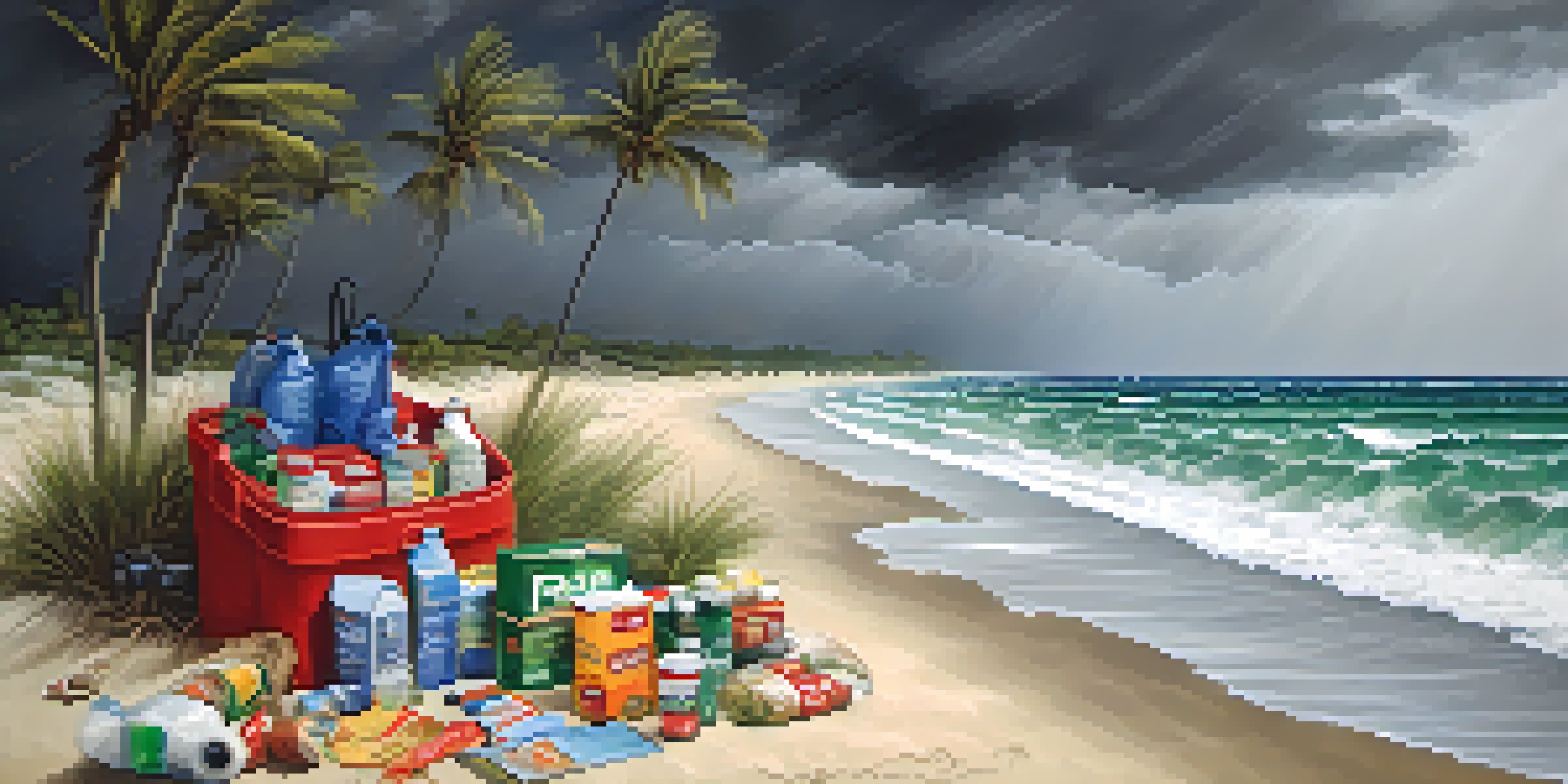Hurricanes and Miami: Preparedness for Extreme Weather

Understanding Hurricanes: What You Need to Know
Hurricanes are powerful tropical storms that can cause widespread destruction. They form over warm ocean waters and can bring heavy rains, strong winds, and storm surges. Understanding how hurricanes develop and their potential impact is crucial for Miami residents, as the city lies in a hurricane-prone region.
Preparation through education is less costly than learning through tragedy.
Typically, hurricanes are categorized on a scale from 1 to 5, with Category 1 being the least severe and Category 5 being catastrophic. This classification helps gauge the potential damage and the urgency of preparedness needed. For Miami, even a Category 1 hurricane can lead to significant disruption and danger.
Being informed about hurricane season, which runs from June 1 to November 30, allows residents to stay vigilant. Knowing the signs of a storm and the associated risks can make a significant difference in your safety and that of your loved ones.
Creating a Family Emergency Plan for Hurricanes
An effective emergency plan is your first line of defense against hurricanes. Start by discussing with your family what to do in case of a hurricane warning. Assign roles and establish a communication plan, so everyone knows how to stay in touch if separated.

It's important to identify safe locations, whether it's a designated storm shelter or a friend's house away from the coast. Make sure each family member knows how to get there, and practice the route ahead of time. This preparation can alleviate stress during an actual emergency.
Hurricane Preparedness is Key
Understanding hurricanes and creating a solid emergency plan can significantly enhance safety for Miami residents.
Don’t forget to include your pets in the plan. Make arrangements for their safety and care during a hurricane, as they are part of your family too. Always have a pet emergency kit ready with food, water, and any medications they may need.
Building a Comprehensive Emergency Kit
An emergency kit is a vital resource during a hurricane. Start by gathering essentials such as non-perishable food, water, and a flashlight. Aim for at least a three-day supply for each family member and don’t forget to include items like batteries and a first aid kit.
The best way to predict your future is to create it.
In addition to basic needs, consider including important documents. Keep copies of insurance policies, identification, and medical records in a waterproof container. This can help you manage claims and recover more quickly after the storm.
Don’t overlook the importance of entertainment and comfort items, especially for children. Pack games, books, and toys to help pass the time during power outages or when sheltering in place.
Staying Informed: Weather Alerts and Updates
During hurricane season, staying informed is crucial. Sign up for weather alerts from local authorities and download apps that provide real-time updates. Knowing when a storm is approaching allows you to take action before it's too late.
Television and radio broadcasts are also excellent sources of information. They provide updates on the storm's path, intensity, and safety recommendations. Familiarize yourself with local emergency management agencies, so you know where to turn for reliable information.
Essential Emergency Kits Needed
Building a comprehensive emergency kit with food, water, and important documents is vital for surviving a hurricane.
Social media can be another useful tool, but ensure you're following trustworthy pages. Misinformation can spread quickly, so always verify news through official channels. Staying informed helps you make informed decisions during a crisis.
Understanding Evacuation Routes and Procedures
Knowing your evacuation routes can be a lifesaver during a hurricane. Miami has designated evacuation zones, so familiarize yourself with your zone and the nearest routes. Planning ahead ensures you have a clear path to safety when the time comes.
Make a note of local shelters and their locations, as they can provide refuge during a storm. Check for any specific requirements, such as pet policies or accessibility options, to ensure your family's needs are met.
Practice your evacuation plan with your family to ensure everyone knows what to do. Regular drills can help reduce panic and confusion, making it easier to evacuate quickly and safely when faced with a hurricane.
Securing Your Home Against Hurricane Damage
Before hurricane season, take steps to secure your home. Installing storm shutters or boarding up windows can protect against flying debris. Ensuring your roof is in good condition can also prevent water damage during heavy rains.
Consider landscaping strategies to minimize damage. Trim trees and shrubs that could pose a risk to your home, and secure outdoor furniture and decorations. These small actions can significantly reduce the risk of property damage.
Post-Storm Recovery Steps
After a hurricane, prioritizing safety, documenting damage, and seeking emotional support are crucial for effective recovery.
Lastly, review your homeowner's insurance policy to understand your coverage. Make sure it includes hurricane damage and consider additional flood insurance if necessary. Being proactive can save you stress and money in the long run.
Post-Hurricane Recovery: Steps to Take
After a hurricane, the recovery process begins. First and foremost, ensure your safety before re-entering your home. Look for any signs of damage, such as gas leaks or structural issues, and report them to authorities if necessary.
Document any damage with photos for insurance claims. This information will be essential for filing your claim and seeking assistance. Local agencies often provide support, so don't hesitate to reach out for help during this challenging time.

Finally, give yourself time to recover emotionally as well as physically. Hurricanes can be traumatic experiences, and it’s important to check in with friends and family. Support systems are vital during recovery, and sharing your feelings can help everyone heal.